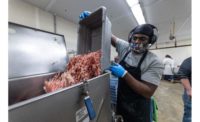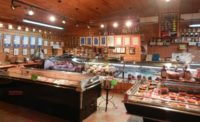Like many companies that catered to the foodservice industry, D’Artagnan started operations one day to find that 75 percent of its business was gone. Thanks to the threat of Coronavirus, the restaurant industry essentially shut down. “March 14, boom. No more customers,” says Ariane Daguin, founder of the gourmet food purveyor.
The company not only had product in its Union, N.J., warehouse, but it also had its distribution centers in Chicago, Atlanta, Houston and Denver, along with 78 delivery trucks and hundreds of employees. Quickly, D’Artagnan adapted to the new realities created by the pandemic and shifted its focus to the retail and e-commerce side of the business. It made the shift without having to let go of any of its employees.
“Everyone who was here and was working on the restaurant side of the business, the sales people who were talking to the chefs, they now have been adopted by the retail team, and they are selling to retail stores and calling retail stores, one by one,” Daguin says.
At the time the restaurants shut down due to shelter-in-place orders, approximately three-quarters of D’Artagnan’s sales came from the foodservice industry. Daguin estimates that another 15 percent was retail, and 10 percent was e-commerce. That e-commerce was all done through third-party logistics, as the company didn’t have a home delivery service. Now, it does.
“We did divert the trucks and the drivers to be able to go and deliver to certain particular towns and the suburban areas where our delivery centers are strong,” she explains. “We’ve been trying to develop those home deliveries, instead of keeping the drivers without doing anything and the trucks in the parking lot.”
The changes to the company’s day-to-day operations are noticeable. People who could work from home are doing so. The company’s headquarters in Union no longer allow outsiders, including truckers bringing meat from local farms or processors. Even sales or office personnel who need to go into the warehouse can no longer go through the side door. They have to exit the building, walk to the warehouse entrance and have their temperature checked. They must also be wearing a mask and gloves before they are allowed in. Changes have been made in the warehouse operations as well, where employees were used to pulling boxes of products for delivery.
“Pickers and packers have now to deal with small packages in one piece and two pieces instead of whole cases. The picking is different, the packing is different,” Daguin says.
The types of products that D’Artagnan sells have changed as well, as portions have shrunk.
“Instead of whole strip loins, whole ribeyes, we will make steaks. That was mandatory,” she says. “And that probably is going to stay because the restaurants, when they reopen and if they are restrained from the number of clients that they can have during one service, they probably will want to gear more towards that portion control method also. I don’t think it’s a temporary thing. I think it’s here to stay with smaller portions, for sure.”
When it comes to growing its e-commerce business, Daguin jokes that the fish jumped into the boat. With restaurants shutting down, people needed to cook at home, so they flocked to e-commerce sites and retail stores. She believes that consumers who are turning to D’Artagnan products for the first time may become long-term customers.
“I think it’s good for us in the long term because they are actually seeing first-hand what chefs knew all along, which is a happy chicken is a tasty chicken. A chicken well raised is so much superior in taste than the commodity, factory farm chicken,” she says.
D’Artagnan has tried to use its position in the food industry to support its farmers. Daguin says that the farmers who sell beef, chicken and lamb will do alright, because they are raising the products that are in high demand. She worries about the rabbit, bison, quail, duck, heritage pork and other exotic producers. The company has partnered with Farm Aid to create an All for One Farmer’s Fund to help those small farmers. E-commerce customers can donate, and Daguin called her chef friends like Tom Colicchio, Bobby Flay and Elizabeth Falkner, as well as celebrities like actor John Lithgow and designer Rebecca Minkoff, to promote the Fund.
Daguin founded the company 35 years ago after arriving to the country from her native France. She chose the name “D’Artagnan” after one of the characters from The Three Musketeers. Their motto, “All for one and one for all,” became the motto of the company as well. Even during the pandemic, the company has held to its philosophy. The company’s employees pulled together, adapted to the situation, and made the necessary changes without having to reduce its staff.
“Even though it was a huge U-turn that we had to do very quickly, everybody was in it and understood the stake and that we’re in this together, and we’re as strong as the weakest link,” she says.





Report Abusive Comment